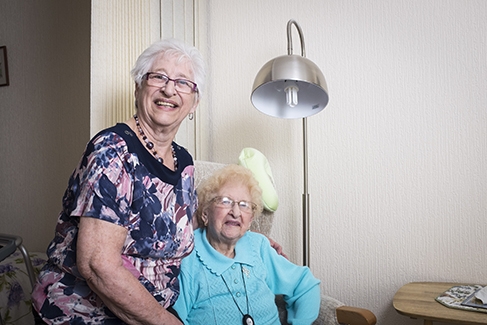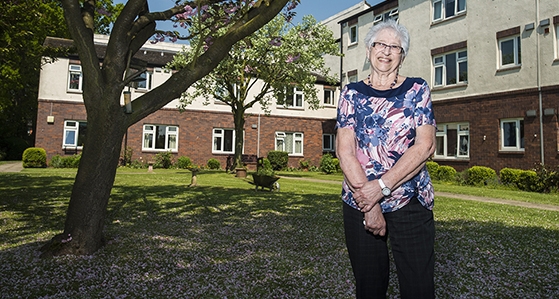You are viewing 1 of your 1 free articles
Golden years
As the sector waits for the government’s verdict on funding for supported housing, Simon Brandon speaks to some of the older people who currently rely on these services
Video:
features style

Thelma Foxhall outside the supported housing scheme she lives in
Thelma Foxhall is 79 years old and lives on the first floor of a small supported housing scheme in Selby, North Yorkshire. Her mother, Hilda Hammocks - who celebrated her 100th birthday in April this year - lives downstairs.
A few years ago, Ms Hammocks was taken ill. Both she and her family decided it might be time to move into a nursing home, but a brief visit was all it took to quash the idea.
“She said, ‘I don’t think I’m ready for that yet - I’m not old enough,’” recalls Ms Foxhall. “If she’d gone into a home at that stage, I don’t think she’d be here now - she would have given up. She has always been very independent, and here she can be as independent as she wants to be.”
Video:
Ad slot
Supported housing has meant a great deal to people such as Ms Foxhall and her mother, who occupy two of the 300,000 supported housing units for older people managed by housing associations in England. Starting next year, however, the number of people able to access facilities like these may shrink.
“She has always been very independent, and here she can be as independent as she wants to be.”
Thelma Foxhall, resident
Back in November last year, the chancellor used the Spending Review to announce that social housing tenants would see their eligibility for housing benefit capped at Local Housing Allowance rates - the same as tenants on housing benefit are eligible for if they rent from a private landlord. This caused immediate worry for tenancies signed after 1 April 2016, particularly in supported housing where rents are usually higher to cover the cost of additional services. By March, the government announced a one-year delay to the implementation of this cap for supported housing tenants. In a statement to parliament, welfare reform minister Lord Freud said the delay was to allow the conclusion of a review of supported housing in order that “appropriate groups are safeguarded”.
We still don’t know what the review will find - and what the outcome will be. A wider exemption for certain people? A different funding arrangement for supported housing? As the sector waits to find out, Inside Housing spoke to some older people living in supported housing to find out what is at stake.

Ms Foxhall and her mother Hilda Hammocks are happy in their homes
“The impact [of the cap] will be felt particularly by older people, who may find themselves remaining in unsuitable housing they can no longer manage.”
Bruce Moore, chief executive, Housing & Care 21
“The sums involved are absolutely huge in terms of the potential loss of housing benefit,” says Hugh Owen, director of strategy and public affairs at Riverside, a provider with 4,800 supported housing units for older people. But the short-term savings made by the government would, he believes, be eclipsed by the extra burden on public services further down the line, as supported housing users such as homeless people or those with drug and alcohol problems become caught up in the criminal justice and mental health systems.
We wanted to focus specifically on older people, however, because supported housing is not a temporary solution for these residents; it is their permanent home. “The impact [of the cap] will be felt particularly by older people, who may find themselves remaining in unsuitable housing they can no longer manage, and more vulnerable to social isolation and health concerns,” says Bruce Moore, chief executive of specialist older people’s accommodation provider Housing & Care 21. “This will in turn increase the burden on state social care and health services.”
The first finding is that - even though existing tenants of supported housing will not be directly affected by the cap - it could have a knock-on effect. This is because it may have implications for the ongoing viability of supported housing schemes, and the tenants already living in them.
“Over time, the proportion of people that have their housing benefit capped will increase year on year, as people die and new people come in,” says Mario Ambrosi, head of policy at Anchor, a 30,000-home provider of housing for older people, including the home of Ms Foxhall and her mother. “The risk is that, without proper protection, an increasing number of people can’t afford supported housing, and so over time, the viability of those schemes decreases because you’ve got fewer people who are able to pay the cost of the service.”
According to the National Housing Federation’s Health and Housing Group, using data collected from providers, if the cap were to go ahead without any changes, 41% of existing supported housing units of all kinds would close, while 21% of providers would have to close every scheme.
For Ms Foxhall and her mother, it’s a question of quality of life rather than finances. “I feel secure here,” Ms Foxhall says. “It would be a shame if it was done away with.”
“I feel secure here, whereas before I felt isolated.”
Michael Logan, resident
Michael Logan
Michael Logan is 63 and has Parkinson’s disease. He has lived in St Clements Court, a supported housing scheme in Sheffield managed by Anchor, for the past eight years.
Asked where he thinks he would be if not for supported housing, Mr Logan is blunt: “I should think I’d be in City Road Crematorium somewhere.”
“I couldn’t manage in my house, so I had to come into a place like this,” he says. “It made a hell of a lot of difference. When I had my own property, and I was on my own, I started to panic at every change in my condition. I feel secure here, whereas before I felt isolated.”
Today, however, Mr Logan feels a little less secure, even though he won’t be directly affected as the cap only comes in for new tenants from April next year.
“In the future, if they implement this cap on housing benefit, then the people who use these schemes won’t be able to come in,” he says. “I can’t see Anchor keeping my scheme open if they are not allowed to put bums on seats. I am afraid we might have to find somewhere else. It is quite frightening.”
“This kind of housing should be made available to all, irrespective of their finances.”
Margaret Britten, resident
Margaret Britten
Margaret Britten, 68, lives in King James Court, a supported housing scheme in Berwick-upon-Tweed, with her husband. She is, it is safe to say, not a fan of the government’s proposal.
“It’s going to put a big financial obstacle in the way of future tenants who then may not be able to afford their supported housing,” she says. “This kind of housing should be made available to all, irrespective of their finances.”
She and her husband, who is disabled, moved into King James Court nine years ago. “I do most of his mobility things - I do the shopping and stuff like that,” says Ms Britten. “And I can rest easy that if I’m not there for any reason he can access the help he needs.”
The support provided to the Brittens gives them “peace of mind”, she says. “We get an early-morning call; we have the laundry done, the gardens, the windows are cleaned. The kind of things that as you get older you are not able to do. There is always somebody on hand.”
Ms Britten describes supported housing as a transition: “You need a little bit of help to be independent but you don’t need to live in a home,” she says. “If we were to lose all that now - if we went back to living in a rented property or a council house - my husband’s life would become a lot more difficult. And so future tenants will need more help from the NHS or carers; it doesn’t make sense to me to cap it, because any savings will get used up by the health service.”









